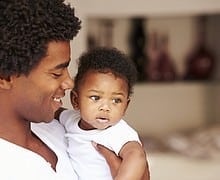Lifestyle changes and poor eating habits lead to weight gain in new fathers
Though the dad bod may be all the rage these days, packing on the pounds post fatherhood is not a good health trend. But this is exactly what new fathers are doing, according to a new study. Men gain weight after they become fathers for the first time whether or not they live with their children, says the Northwestern Medicine study, which, for 20 years, tracked the weight of more than 10,000 men from adolescence to young adulthood.
The study, published in the American Journal of Men’s Health, found that the typical 6-foot-tall man who lives with his child gained an average of about 4.4 pounds after becoming a first-time dad. The 6-foot-tall dad who does not live with his child gained about 3.3 pounds. By contrast, the non-dads in the study population lost 1.4 pounds.
“Fatherhood can affect the health of young men, above the already known effect of marriage,” said lead author Craig Garfield, M.D., associate professor of pediatrics and of medical social sciences at Northwestern University Feinberg School of Medicine. “The more weight the fathers gain and the higher their BMI, the greater risk they have for developing heart disease as well as diabetes and cancer.”
Researchers chalk up the new fathers’ weight gain to shifting priorities and poor eating habits.
“You have new responsibilities when you have your kids and may not have time to take care of yourself the way you once did in terms of exercise,” Dr. Garfield said.
And as the house fills with chips, donuts, ice cream and other unhealthy snack food, dads may start to see their waistline expand proportionally. “We all know dads who clean their kids’ plates after every meal,” Dr. Garfield said.
Over the course of the study, all participants had their BMI measured at four different points: early adolescence, later adolescence, mid-20s and early 30s. Each participant was categorized either as a non-father, resident father or non-resident father. Researchers looked at each person’s BMI at each time point and averaged all those measurements to determine whether their fatherhood status was associated with their BMI.
The study also found that many new fathers think they’re young and healthy and don’t need their own doctor, Dr. Garfield said. This puts pediatricians in a good position to counsel dads about taking care of their health. “New dads are coming into the health-care system as a pediatric chaperone,” he said. “This is an opportunity to talk about things that are important for dad’s health and the child’s health and to offer dads nutritional counseling and mental health education.”
Earlier research has suggested new fathers have an increase in depression symptoms in the early years after their child’s birth. “We now realize the transition to fatherhood is an important developmental life stage for men’s health,” Dr. Garfield said. “It’s a magical moment where so many things change in a man’s life. Now the medical field needs to think about how can we help these men of child-rearing age who often don’t come to the doctor’s office for themselves.”





